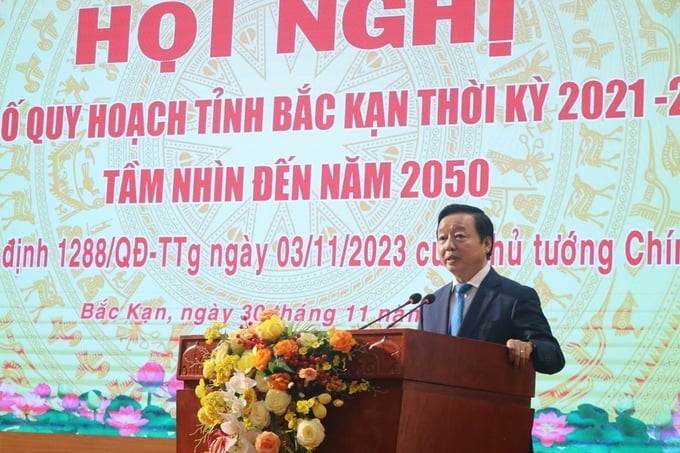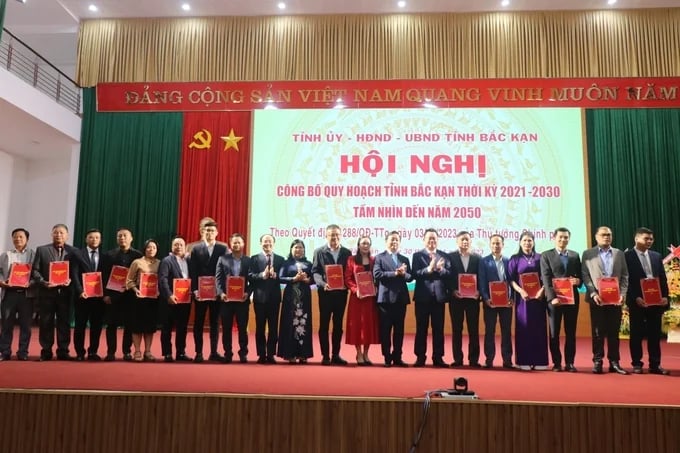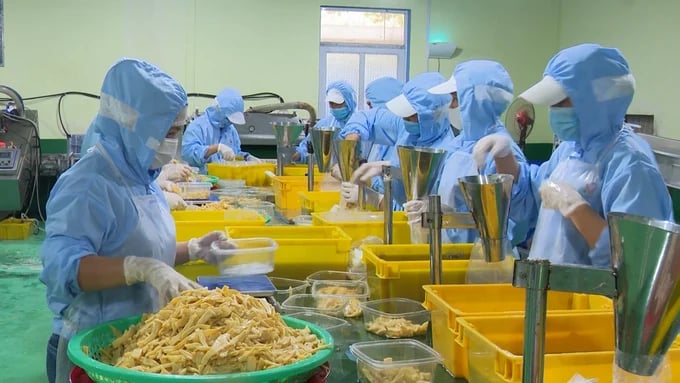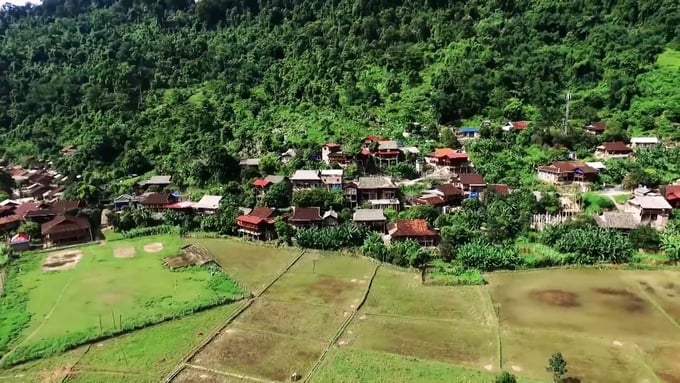May 20, 2025 | 14:27 GMT +7
May 20, 2025 | 14:27 GMT +7
Hotline: 0913.378.918
May 20, 2025 | 14:27 GMT +7
Hotline: 0913.378.918

Deputy Prime Minister Tran Hong Ha emphasized that Bac Kan has advantages in developing the forest economy and needs to be exploited effectively. Photo: Ngoc Tu.
On November 30, Bac Kan province held a ceremony to announce the planning of Bac Kan province for the period 2021-2023, with a vision for 2050. Deputy Prime Minister Tran Hong Ha attended and directed the conference.Previously, on November 3, 2023, the Prime Minister issued Decision No. 1288/QD-TTg approving the Planning of Bac Kan province for the period from 2021 to 2030, with a vision to 2050. This is a strategic plan that opens up prospects for cooperation and investment opportunities for the province with domestic and international partners.
According to the plan, by 2030, Bac Kan will become a province with average, sustainable development of the region with a spatial system of harmonious development and reasonable balance between urban and rural areas, between economic development areas and ecological and cultural conservation.
The economy develops in a green and dynamic direction with a synchronous and modern socio-economic infrastructure system, digital infrastructure, and cultural and social fields receiving investment attention.
The provincial planning has proposed 5 key tasks, 6 development breakthroughs, 3 economic corridors and 5 socio-economic regions. In which, the driving force axes of development are formed with the economic corridor Hanoi - Thai Nguyen - Bac Kan - Cao Bang and the economic corridor Tuyen Quang - Bac Kan - Lang Son.
One of the six breakthroughs identified in the plan is attracting investment in the tourism sector. It focuses on developing resort tourism, bringing the resort real estate market to the leading group in the Northern midland and mountainous provinces.
Bac Kan province currently has 8 national relics, including 2 special national relics, and 36 provincial relics, with the highlight being Ba Be Lake - the special national relic. In the planning, the Ba Be Lake tourist area will become a national tourist area with unique products and types of tourism with its own identity. Bac Kan will also attract investment in 10 ecological, resort tourism, cultural and sports complexes and golf courses in 6 districts and cities.

Many memoranda of investment cooperation in Bac Kan province were signed at the conference. Photo: Ngoc Tu.
Regarding the development of agriculture and forestry, Bac Kan focuses on commodity production, gradually building a high-tech agricultural model. Strongly transform new thinking and forms of production and business organization according to agricultural economic orientation, promoting cooperation and association.
Bac Kan province's planning also clearly defines the goal of "building Bac Kan into a centre for wood and medicinal production and processing of the Northern midland and mountainous region".
Regarding industry, restructuring manufacturing industries is associated with shifting and increasing the proportion of engineering and high-tech industries, with priority given to attracting investment in agricultural and forestry product processing industries.
Regarding renewable energy, Bac Kan is considered to have advantages in renewable energy with high wind speeds, available sources of forestry by-products and many rivers and streams with steep slopes. According to the decision approving the provincial planning, Bac Kan's wind power potential is 2,680 MW, biomass power is 220 MW, and hydropower is more than 39 MW.
This will be an opportunity for Bac Kan province to attract investment in developing wind power, biomass power, and hydropower in accordance with the natural conditions of the province's terrain and climate.

Developing the agricultural and forestry product processing industry is a priority of Bac Kan province. Photo: Ngoc Tu.
Bac Kan has also planned 27 industrial clusters with an area of more than 676 ha, 3 industrial parks with an area of 204 ha and will expand and establish 4 more industrial parks with an area of 2,157 ha.
One of the important development breakthroughs in provincial planning from 2021 to 2030 and vision to 2050 is investing in completing the transportation infrastructure system connecting economic corridors in the Northern midlands and mountainous regions. Currently, the province is preparing to invest in the 4-lane Cho Moi - Bac Kan City expressway, constructing a road from Bac Kan City to Ba Be Lake connecting to Na Hang (Tuyen Quang province), thereby shortening the distance from Hanoi to Ba Be Lake to only 2 hours and 30 minutes.
At the same time, currently, the two provinces of Bac Kan and Cao Bang are accelerating the preparation for investment in the expressway connecting Bac Kan - Cao Bang and striving to complete construction before 2030. At that time, along with the horizontal connecting routes of Tuyen Quang - Bac Kan - Lang Son, the province's road transport system will be basically synchronous, and a driving force for economic development.
At that time, along with the horizontal connecting routes of Tuyen Quang - Bac Kan - Lang Son, the province's road transport system will be basically synchronous, and a driving force for economic development.
Regarding urban infrastructure planning, the provincial planning also determines that by 2030, Bac Kan province will have Bac Kan city as a class II urban area; with 4 urban areas including Dong Tam, Cho Ra, Bang Lung, and Yen Lac towns being class 4 urban areas.
Speaking at the announcement ceremony, Deputy Prime Minister Tran Hong Ha praised the outstanding achievements of the Party, government, and the people of Bac Kan province have achieved throughout the past journey.
The Deputy Prime Minister requested Bac Kan province to maximize its potential for economic development in agriculture, and forestry, and bring agricultural and forestry products deeper into global value chains. Develop the brand, expand the market, increase the application of science and technology, and focus on effectively implementing the OCOP program.Deputy Prime Minister Tran Hong Ha also noted that Bac Kan province focuses resources on developing the forest economy with 3 focuses: Developing carbon credit production services, developing biomass electricity and the forest product processing industry.

Developing cultural and experiential tourism associated with Ba Be Lake is the focus of tourism development in Bac Kan province in the coming time. Photo: Ngoc Tu.
Translated by Hoang Duy

(VAN) Dong Thap farmers attained an average profit margin of 64% during the summer-autumn 2024 crop (first season), while An Giang and Kien Giang farmers followed with 56% and 54%, respectively.

(VAN) As a doctoral student doing research on renewable energy and electrification at Harvard University, the author shares his musings on electricity, nature, and countryside memories.

(VAN) The decree on Extended Producer Responsibility (EPR) ensures transparent management and disbursement of support funds, avoiding the creation of a “give-and-take” mechanism.

(VAN) Hue City rigorously enforces regulations regarding marine fishing and resource exploitation, with a particular emphasis on the monitoring of fishing vessels to prevent illegal, unreported, and unregulated (IUU) fishing.

(VAN) Hanoi People's Committee has issued a plan on reducing greenhouse gas emissions in the waste management sector with 2030 vision.

(VAN) Vietnam's draft amendment to Decree No. 156 proposes a mechanism for medicinal herb farming under forest canopies, linking economic development to population retention and the sustainable protection and development of forests.

(VAN) In reality, many craft village models combined with tourism in Son La have proven effective, bringing significant economic benefits to rural communities.